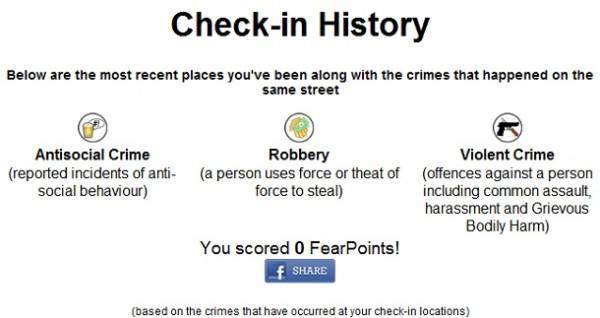
Whether it’s PleaseRobMe, the site that aggregated people’s publicly-shared check-ins, or Creepy, the app that aggregates public check-ins and photos, location-based services hit on a nerve. But what if they could be used to show us personalized crime data about the places we already go?
The Lincoln Social Computing Research Centre has turned the relationship between LBS apps and safety on its head with a mashup called Fearsquare. Fearsquare uses public data to show Foursquare users in the U.K. how many crimes have been committed in the places they check in and is part of a study looking at how this sort of personalized data could change user behavior.
Rather than scaring users about publicly sharing their location, Fearsquare “takes a list of your ten most recent FourSquare check-ins and cross-references these with the UK Police Crime Statistics database” and shows “how many crimes were committed, during a recent one-month period, in the locations where they checked-in.” It is all part of an opt-in study that examines “the interaction of people with crime statistics that are presented in a uniquely personal manner.”
After authorizing Foursquare, Fearsquare makes the comparison and shows you how many instances of robbery, violent crime and “antisocial crime” have occurred in the vicinity. They can then see how they rank on a leaderboard of users and “FearPoints.”

“We are interested in how this information affects peoples’ fear of crime and in whether peoples perceptions of how much crime they are exposed to on a daily basis reflects the reality,” the site explains. “We are also interested in whether data represented in this manner is found to be useful by participants.”
What do you think – would crime data for all of the locations you visit (and check in to) change where you go? If you found out that the restaurant across town was near several robberies and violent crimes, would you reconsider? Or are numbers not enough? Does what you see around you and your judgement override the data, or vice versa?

















